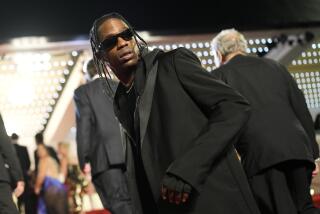Message in a Battle at Sting Concert
CAIRO — Camp David is out, for sure. Oslo and Madrid? Unlikely. But mediated peace talks somewhere might be the only way to calm the most recent Middle East conflict--one that has heightened anti-Western rhetoric here and embittered thousands of Egyptians.
It started with a rock concert. Not just any rock concert, mind you, but a performance by one of the world’s premier pop stars at the foot of one of the Seven Wonders of the World. Sting, live at the Pyramids.
“It was a total mess from the beginning to the end,” said concert-goer Abdelaziz Ismail, 43, who paid 120 Egyptian pounds, about $32, to see the April 25 show.
But wait, we are getting ahead of the story.
It starts with two brothers, Helmy and Hani Soufrakess, local businessmen and concert promoters who thought they could tame the notoriously maddening Egyptian bureaucracy to bring a first-rate performer to a Third World location. They figured they could add to the event’s aura by wrapping it in a politically resonant theme: bringing the world closer through music. To that end, they invited Hakim, an Egyptian recording star popular among young people, to help open the event.
“The idea was to make a musical understanding between East and West,” Helmy Soufrakess said. “I could have had just Sting. But that would have been a slap in the face to Egypt.”
As it turns out, the brothers miscalculated--badly. A local magazine dubbed what took place the night of April 25 “Desert Thorn.” One newspaper called it “That stinging sensation.”
The red flags were there from the beginning.
Nagwa Hassaan, 27, who also paid 120 pounds for her ticket, headed out to the concert site well ahead of Sting’s scheduled 10 p.m. start time. She pulled into the area where organizers had said ticket-holders could catch a shuttle bus, and she waited. And waited. A few buses shot by. Eventually, like thousands of others, she trekked six miles through the desert to the concert site. Many people never made it at all--because there was no bus pickup. Officials blame the Soufrakess brothers for that, and the brothers blame officials.
The ticket-holders who forged ahead found a location that was suitable for, at most, 10,000 revelers but was filled with nearly twice that many. Once more, local authorities and the Soufrakesses accuse one another of being at fault. It seems that despite the police and security agents ringing the area, thousands of people without tickets just walked in. Conversely, hundreds who had paid were turned away because there was no room.
Though the cause is again a matter of dispute, Hakim, the Egyptian singer, arrived late. So the promoters canceled his appearance--and that’s when the Soufrakesses realized just how badly they had miscalculated. Instead of heading quietly home, the singer grabbed a microphone, bolted onto the stage and, with Egypt’s most magnificent cultural icon as a backdrop, hollered: “I was supposed to perform, but I can’t because of Sting.” The rant that followed concluded: “Whoever is willing to accept the insult of an Egyptian in Egypt can stay. Good night!”
Hakim was so angry, in fact, that he held a news conference four days later and once again raised the issue of Western arrogance. Hani Soufrakess attended the news conference and reportedly became the target of shouts and taunts from local journalists.
“If the Englishman can have his pride, why can’t I as an Egyptian have my pride?” he was quoted as saying by the weekly English-language Cairo Times.
More than a week later, the brouhaha isn’t over. Many concert-goers have filed complaints with the police, in some cases demanding their money back. Hakim has continued to stoke nationalist sentiments, insisting that he is an Egyptian artist who was spurned by Westerners. And antiquities officials are calling for a ban on all such events at the Pyramids.
“This is an archeological site that includes more than 10,000 tombs. It is a sacred place and should be respected. It is not a place for dancing,” said Ahmed Haggar, who is responsible for the Pyramid Ruins Area.
Ever the businessman, Helmy Soufrakess is struggling to put the best face on the fiasco.
“It was a very successful event,” he said. “Maybe there was confusion with traffic, maybe there were problems with security, maybe Hakim didn’t sing. But at the end of the day, it was a dream concert.”
More to Read
Sign up for Essential California
The most important California stories and recommendations in your inbox every morning.
You may occasionally receive promotional content from the Los Angeles Times.









